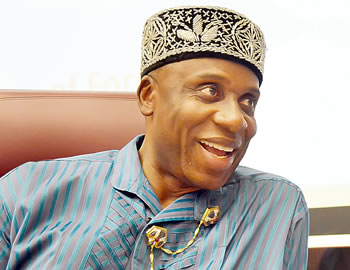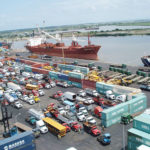First appointed in 2015 as Minister of Transportation and later re-appointed for a second term in 2019, Rotimi Amaechi resigned as Minister last week, bringing an end to almost eight years in charge of the nation’s maritime sector. In this report, TOLA ADENUBI examines the highs and lows of the tenure of the immediate past Minister of Transportation.
When Rotimi Amaechi took over as Minister of Transportation, the nation’s maritime industry was facing many ills in the form of chaotic cargo evacuation processes which was compounded by a traffic snarl along the ports access roads. With the ports almost under siege by thousands of articulated vehicles lined up along the ports’ access roads, the cost of haulage of containers out of the ports ballooned to record heights. Aside from the mess that was associated with cargo clearance at the nation’s ports, the nation’s waters were being exposed to incessant attacks on vessels calling at the nation’s ports, a situation that forced many ships to divert cargoes meant for Nigerian ports to neighbouring ports.
Also, the issue of a lack of capacity for indigenous ship-owners was on the front burner before the minister came on board while the nation’s maritime training institution, the Maritime Academy of Nigeria was on the verge of being delisted from the White List of the International Maritime Organisation (IMO) due to decades of rot that had left the school visionless.
Achievements
Top of the achievements of Rotimi Amaechi as Minister of Transportation was the refocusing of the nation’s training institution, the Maritime Academy of Nigeria back to where it should truly belong. The Minister in 2017 constituted a committee to audit the Academy and make recommendations to the Federal Ministry of Transportation. On completion of the audit of the Academy, Rotimi Amaechi set up an Interim Management Committee (IMC) in September 2017 to run the Academy. Its mandate was to restructure and reposition the Academy, with a view to bringing the institution at par with like academies worldwide. The IMC concluded its assignment in March 2018 and proposed useful recommendations, especially training reforms. On completion of its task, Rotimi Amaechi recommended the appointment of Commodore Duja Effedua as Rector. With the appointment of Duja Effedua as Rector, the Academy was transformed from a school that was on the verge of being delisted from the IMO White List to the most equipped maritime institution in the West African sub-region.
Another feat Rotimi Amaechi achieved as Minister was the restoration of sanity on the nation’s waterways through the launch of the Integrated National Security and Waterways Protection Infrastructure, also known as the Deep Blue Project.
IN CASE YOU MISSED THESE FROM NIGERIAN TRIBUNE
- Revealed! Details Of South-West APC Leaders Meeting With Presidential Aspirants
- Supreme Court Has Cleared Civil Servants To Participate In Politics, Falana Tells FG
- Battle For New Alaafin Begins As Ruling Houses Insist On Producing Next Oba
- Court Admits More Evidence Against Alleged Fake Army General, Bolarinwa
- I’m Every Man’s Choice Now, My DM Is Crazy —Eniola Badmus
- It Is Now Bye To Decency: Crazy Fashion Trends At Owambe Parties
Prior to the launch of the Deep Blue project under the Nigerian Maritime Administration and Safety Agency (NIMASA) in June of 2021, the nation’s waters were the scene of many piracy attacks on container ships.
By the third quarter of 2021, five months after the launch of the Deep Blue assets, the International Maritime Bureau (IMB) reported in its third-quarter report that Nigeria had achieved a 77 per cent decrease in piracy attacks compared to the same period of 2020.
According to the IMB, “Nigeria reported four incidents in the first nine months of 2021, in comparison to 17 in 2020 and 41 in 2018. This represents a 77 per cent decrease in incidents between 2021 and 2020, and a 95 per cent reduction from 2018.”
Another scorecard for Amaechi as Minister was the deployment of the Eto E-Call-Up system at the ports. The E-Call-Up system was introduced to checkmate the influx of articulated vehicles along the nation’s ports’ access roads. With Eto, the access roads leading to Apapa port became free of long queues of articulated vehicles, although not much success was recorded at the Apapa-Oshodi end of the Tin-Can port access road.
Also, as Minister of Transportation, Amaechi succeeded in linking the nation’s busiest ports to the standard gauge rail which stretched from Lagos to Ibadan. The idea of the connection of the ports to the standard gauge rail was to introduce an intermodal means of cargo clearance at the nation’s ports. The huge reliance on road haulage of cargoes was already telling on the nation’s highways, and the connection of the port to the standard gauge rail was a plan by the government to decongest the ports which were already congested.
Failures
A major low point for the immediate past Minister of Transportation was his inability to increase indigenous capacity amongst the nation’s indigenous ship owners. This was due to a lack of disbursement of the Cabotage Vessel Financing Fund (CVFF) which he initially promised to disburse in his first four years as Minister, but failed to disburse. With many indigenous ship-owners running bankrupt due to a lack of support from the government, foreign vessels continued to plunder the nation’s cabotage domain, thereby leading to a huge capital flight for the economy.
Another low point for Amaechi’s almost eight years tenure as Minister of Transportation is the inability of the Federal Government to implement a Single Window regime at the nation’s ports. Without a Single Window for cargo clearance processes, agencies of government continued to work at cross purposes with cargo owners. The implication of a lack of a Single Window at the nation’s ports meant that cargoes were stopped and searched at will by different agencies of government on the roads even when such cargoes had been duly inspected and exited from the ports. Thus, the proliferation of human to human contact during cargo clearance processes promoted corruption at the nation’s ports as cargo owners continued to pay through their noses to evacuate their consignments.
Again, under Rotimi Amaechi’s tenure as Minister of Transportation, Nigeria never won re-election into the IMO Category C Council despite repeated efforts made. The Council is the executive organ of IMO and is responsible, under the Assembly, for supervising the work of the Organization. Between sessions of the Assembly, the Council performs the functions of the Assembly, except that of making recommendations to governments on maritime safety and pollution prevention.
For the records, Nigeria last got elected to the IMO Council in 2007, when Temisan Omatseye was serving as Director-General of the Nigerian Maritime Administration and Safety Agency (NIMASA). With repeated IMO Category C losses under Rotimi Amaechi, Nigeria never regained her place among the committee of leading maritime nations at the IMO.
Nigeria’s effort to refloat a national carrier under Rotimi Amaechi also never saw the light of the day. In 2016, the Minister sent a delegation led by the former Executive Secretary of the Nigerian Shippers Council (NSC), Hassan Bello to Singapore to negotiate a deal with the Singaporean shipping firm, Pacific International Lines (PIL) over the possibility of establishing a national carrier for Nigeria.
A Memorandum of Understanding (MoU) was signed between Nigeria and the PIL ceding 60 per cent equity to Nigeria while PIL was to own 40 per cent. The 60 per cent stake for Nigeria was expected to be offloaded to private sector investors when the project comes on stream.
The then Executive Secretary, NSC, Hassan Bello had told transport correspondents in 2016 that the national carrier would come complete with other add-ons like the ship repair yards and training capability for which the federal government was willing to provide the enabling environment. However, almost eight years down the line, the dream of Nigeria having her national shipping line since the demise of the Nigerian National Shipping Line (NNSL) never materialized as PIL pulled out of the deal at some point and the Minister never talked about a national shipping line again till he left office.






